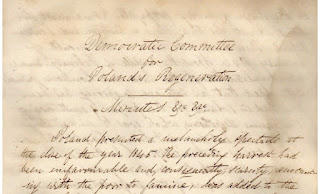Minute books are absolutely central to the collective memory
of any organisation. They record who was there, what they discussed and agreed,
often what financial assets they had, and what they decided to do to advance
their cause. No less so the Chartist movement.
 |
| Extract from the minute book |
Alas, of the many hundreds of minute books that must have at
one time recorded the activities of local branches of the National Charter Association,
its delegate bodies, its central executive and its satellite organisations,
barely one has survived. So the news that the original hand-written minute book
of the Democratic Committee for Poland’s Regeneration has come to light is
hugely exciting.
The 62-page vellum-bound quarto notebook, hand-written by
the prominent Chartist George Julian Harney, recorded the life of the committee
between 1846 and May 1847. It includes a list of the 29 founder members, and of
70 later members, in alphabetical order by town of residence, followed by
minutes of the committee’s meetings, and newspaper cuttings.
In addition to Harney, other leading Chartists involved in
the committee included Feargus O’Connor, Ernest Jones, William Cuffay, Thomas
Martin Wheeler and Philip McGrath. Among the European exiles taking part were
the German radicals Karl Schapper and Heinrich Bauer, and Bartłomiej Beniowski,
a veteran of the 1831 Polish uprising and himself an active Chartist.
The story of the book’s discovery by the historian David
Goodway (author of the classic London Chartism 1838-1848 [Cambridge
University Press, 1982]) and of what it can tell us about the committee and its
place in London radicalism is told in an article for Cairn International
Edition by Fabrice Bensimon, Professor of Modern British History at the
Sorbonne University. His article was translated by Adrian Morfee.
The full text of this fascinating article can be found (in English) here.

